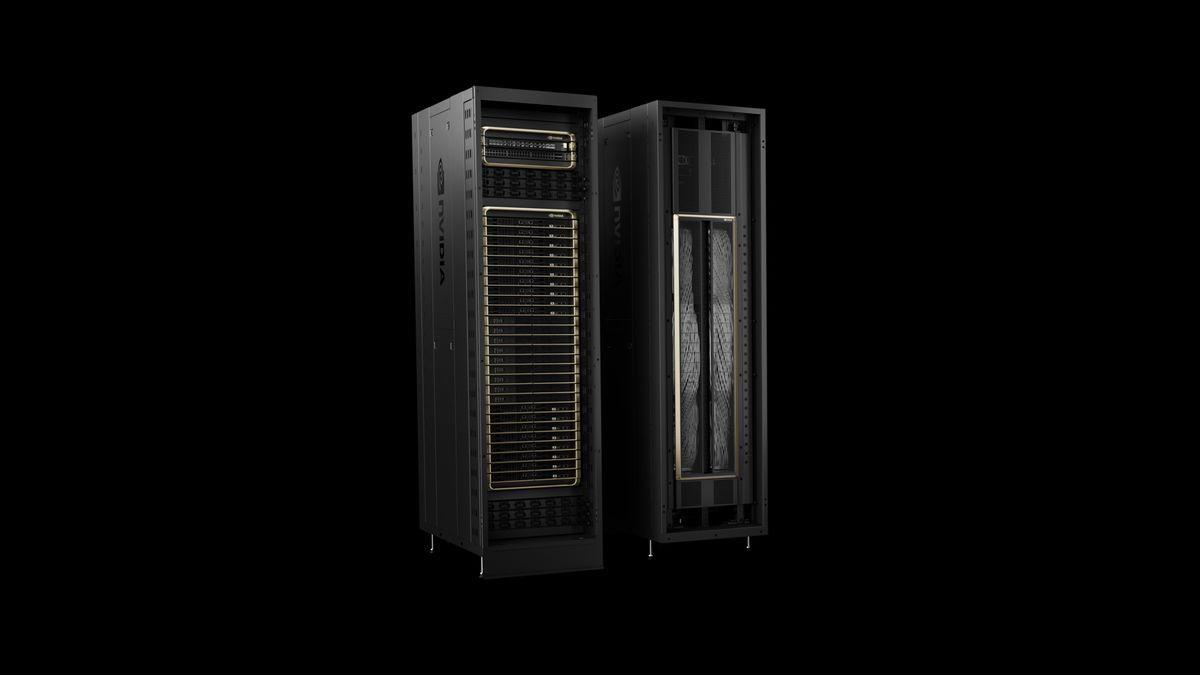Nvidia's Blackwell AI GPU Cooling Issues: Overblown or Resolved?
2 Sources
2 Sources
[1]
Nvidia May Have Already Fixed Blackwell's Cooling Issues
Earlier this week, a report from The Information said Nvidia's Blackwell AI chips were delayed due to an overheating issue that developed when they were placed on server racks, but a third-party research firm claims the problem is overblown and was fixed months ago. Blackwell, which is designed for businesses looking to build out their AI data centers, has server racks that can fit up to 72 GPUs. But Semianalysis, a research firm that focuses on the semiconductor and AI industries, tells Business Insider that Nvidia suppliers reworked the server racks with "minor" changes to address the problem. According to the firm's chief analyst, cooling may be a concern in the future, but the specific server issue in question has been fixed. Nvidia said earlier this week that it is "working with leading cloud service providers as an integral part of our engineering team and process" regarding any potential issues and that "engineering iterations are normal and expected." Overheating GPUs can throttle performance and cause operational issues. Their immediate surroundings (like the number of nearby fans, type of case, or rack design) can directly impact GPU temperature, as well. The GPU's design can also result in higher average temperatures depending on the specific model. But Georgia Tech Professor Bara Cola -- who is also the founder of Carbice, which develops thermal computing solutions -- argues that heat itself isn't Blackwell's biggest challenge. "The real challenge is mechanical stress and not heat. I am confident that Nvidia will find a way to operate these chips for their customers. High-performance chips like this will always run hot, and it is just a matter of balancing how hot -- smart engineers will solve this," Cola tells PCMag via email. "But early failure happens when the interfaces cannot handle the thermal expansion stress that the heat brings. This is a hard materials science problem." Blackwell previously had a "design flaw" unrelated to the server overheating issue. Nvidia CEO Jensen Huang has also said this has since been resolved.
[2]
Nvidia's Blackwell AI GPU overheating issues are seemingly overhyped -- semiconductor analysts reveal cooling issues have been mostly addressed
Blackwell's cooling issues aren't as severe as some might have thought. Reports of Nvidia's GB200 NVL72 server racks overheating have purportedly been exaggerated. Business Insider reports that Blackwell's cooling design faults have already been addressed. Dylan Patel, chief analyst at Semianalysis, purportedly told Business Insider that Blackwell's design issues, which have been present for months, have been largely addressed, stating that the overheating issues are largely overblown. Semianalysis' five analysts monitoring the semiconductor industry reported that the cooling system issues triggering "reworks" from several suppliers were a "minor" change. Blackwell's cooling faults have been specifically problematic with Nvidia's massive 72-chip server rack, which can consume up to 120kW. Design flaws in the rack's design have forced Nvidia to reevaluate its design multiple times due to the GPUs inside overheating. This has setback shipments of Nvidia's GB200 hardware, causing additional delays due to the required design changes. Nvidia's B200 GPUs are the most potent processing chips for AI workloads. The GB200 superchip, for instance, has a configurable TDP in the thousands of watts, with a peak rating of up to 2,700 watts. These absurdly high power figures make air cooling virtually impossible to use in the constraints of a standard rack mount form factor. This physics problem has forced Nvidia to require liquid cooling on its latest Blackwell GPUs. It also requires data centers to revamp their server farms to accommodate the infrastructure needed to support liquid-cooled servers. Nvidia could solve this problem by creating slower air-cooled GPUs -- which the GPU manufacturer still does, in the form of GPUs such as the H200 NVL. However, to remain at the bleeding edge of the AI GPU arms race, Nvidia is prioritizing performance no matter the cost, which is why the company has opted to make GPUs that require thousands of watts of power at the expense of air-cooling. The good news is that Nvidia's 72-chip Blackwell cooling issues are apparently minor and have been largely addressed already. In addition, only Nvidia's flagship 72-chip server rack is having the problem.
Share
Share
Copy Link
Reports of overheating problems with Nvidia's Blackwell AI chips have been exaggerated, according to industry analysts. The company has reportedly addressed the cooling issues in its high-performance server racks.

Nvidia's Blackwell AI GPU: Cooling Concerns Addressed
Nvidia, the leading AI chip manufacturer, has reportedly resolved cooling issues with its latest Blackwell AI GPUs, contrary to recent reports suggesting significant delays due to overheating problems. Industry analysts claim that the concerns have been largely exaggerated and that Nvidia has already implemented solutions to address these challenges
1
2
.The Overheating Controversy
Earlier reports from The Information suggested that Nvidia's Blackwell AI chips were facing delays due to overheating issues when placed on server racks. The GB200 NVL72 server racks, capable of housing up to 72 GPUs, were said to be particularly affected by these thermal challenges
1
.Analyst Insights: A Different Perspective
Dylan Patel, chief analyst at Semianalysis, a research firm focusing on the semiconductor and AI industries, told Business Insider that Nvidia suppliers have already reworked the server racks with "minor" changes to address the problem. According to Patel, while cooling may be a concern in the future, the specific server issue in question has been largely resolved
1
2
.Nvidia's Response
Nvidia has acknowledged that they are "working with leading cloud service providers as an integral part of our engineering team and process" to address any potential issues. The company emphasized that "engineering iterations are normal and expected" in the development of cutting-edge technology
1
.The Cooling Challenge
The Blackwell GPUs, designed for businesses building AI data centers, are incredibly powerful and consume massive amounts of energy. The GB200 superchip, for instance, has a configurable TDP of up to 2,700 watts, making air cooling virtually impossible within standard rack mount form factors
2
.Related Stories
Liquid Cooling: A Necessary Solution
To manage the extreme heat generated by these high-performance chips, Nvidia has opted for liquid cooling solutions. This decision requires data centers to revamp their infrastructure to accommodate liquid-cooled servers, highlighting the company's commitment to prioritizing performance over conventional cooling methods
2
.Expert Opinion on the Real Challenge
Professor Bara Cola from Georgia Tech, who is also the founder of Carbice, a thermal computing solutions company, offers a different perspective on the challenges facing Blackwell:
"The real challenge is mechanical stress and not heat. I am confident that Nvidia will find a way to operate these chips for their customers. High-performance chips like this will always run hot, and it is just a matter of balancing how hot -- smart engineers will solve this," Cola explained
1
.Previous Design Flaws and Resolutions
It's worth noting that Blackwell had previously faced a "design flaw" unrelated to the server overheating issue. Nvidia CEO Jensen Huang has stated that this earlier problem has since been resolved, demonstrating the company's ability to address and overcome technical challenges
1
.As the AI GPU arms race continues, Nvidia's approach of prioritizing performance at the expense of conventional cooling methods underscores the company's commitment to maintaining its position at the forefront of AI technology. While challenges remain, the reported resolution of the cooling issues suggests that Nvidia is well-equipped to handle the complex engineering demands of next-generation AI hardware.
References
Summarized by
Navi
[1]
Related Stories
NVIDIA's GB200 AI Servers Face Overheating Rumors and Order Reductions Amid Conflicting Reports
14 Jan 2025•Technology

Nvidia Overcomes Technical Hurdles, Accelerates Production of Blackwell AI Servers
28 May 2025•Technology

Nvidia's Blackwell AI Servers Face Potential Delays Due to Technical Challenges
18 Dec 2024•Technology

Recent Highlights
1
ByteDance Faces Hollywood Backlash After Seedance 2.0 Creates Unauthorized Celebrity Deepfakes
Technology

2
Microsoft AI chief predicts artificial intelligence will automate most white-collar jobs in 18 months
Business and Economy

3
Google reports state-sponsored hackers exploit Gemini AI across all stages of cyberattacks
Technology





